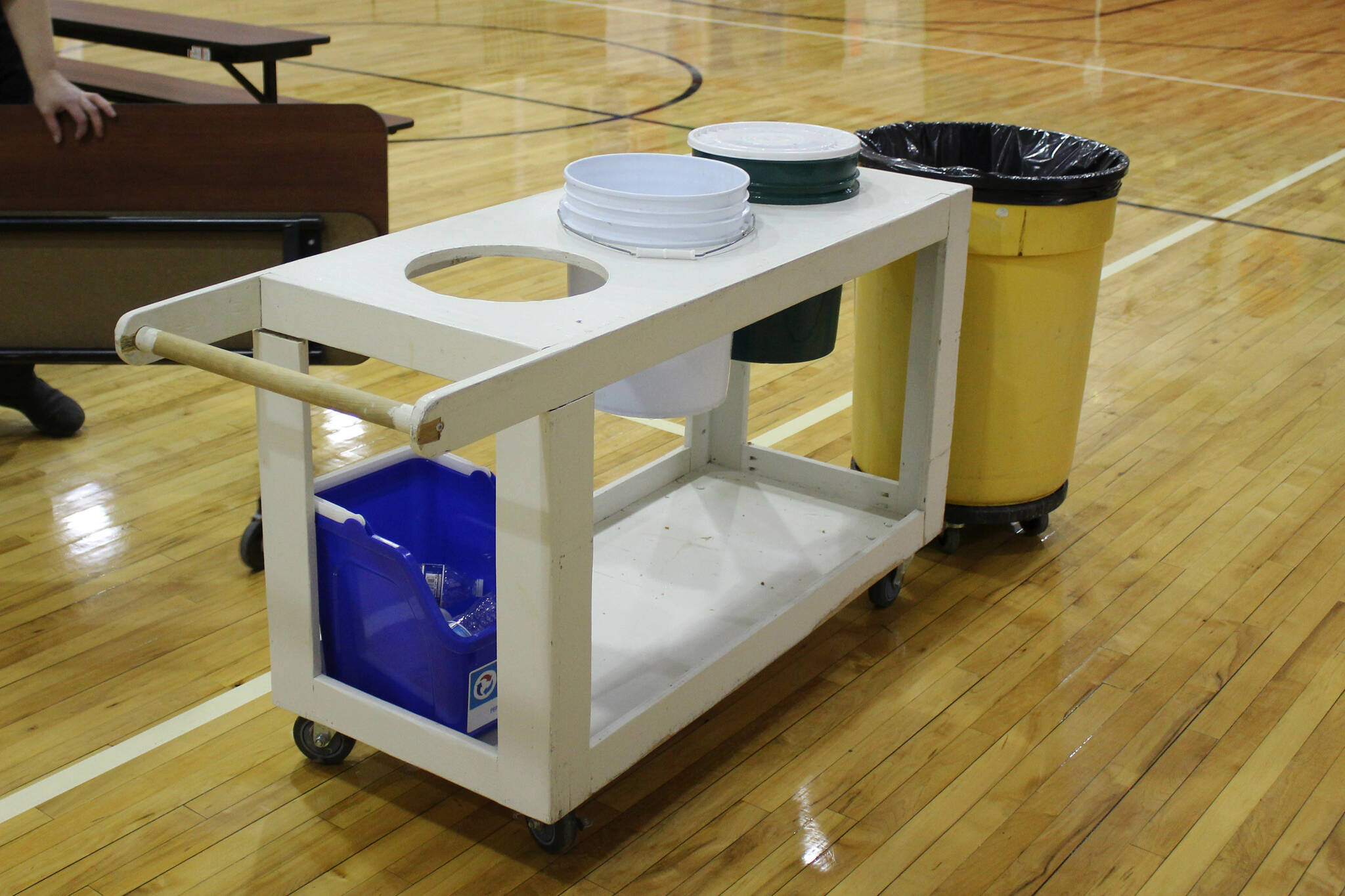The walls of Sterling Elementary School’s gymnasium echo during lunchtime like any other school cafeteria. As dozens of kindergarten through third grade students shuffle in — some with lunch pails and others heading toward a hot lunch queue — they pass a wooden shelving unit holding various buckets and trays.
It’s the school’s one-stop, zero-waste lunchroom shop.
A bright blue tub on the bottom shelf collects plastic bottles, like Gatorade and water. A green bucket on top gathers food scraps, think banana peels and leftover fries.
The white bucket in the middle is for liquids: it’s where students pour out their extra chocolate milk or orange juice.
And lastly is the trash can — a traditional, large yellow bucket that collects everything else.
As the half hour of lunch minutes tick away, more and more students stream toward the unit. Scanning first their lunch tray or lunchbox, then the various containers, tiny hands match what they ate for lunch with its correct container.
They then stack their trays and drop their metal sporks and cloth napkins in their respective tubs.
It’s all part of the school’s zero-waste cafeteria structure, an initiative spearheaded by Sterling Elementary School Principal Denise Kelly, who earlier this year was named the Alaska Association of Elementary School Principals’ 2022 National Distinguished Principal.
“I’m big on recycling and just environmental friendliness and making sure that, you know, we can just do every little part we can,” Kelly said.
Sterling El started making the zero-waste transition five years ago, she said. At that time, students were easily filling between three and four trash bags per day — mostly due to the school-supplied disposable plastic foam trays. Now, they’re down to one per day.
“It just seemed like too much for such a small school,” Kelly said.
The food scraps collected in the lunchroom each day, she said, go to local farmers and, in the spring, to a hunter who uses the discarded meat for bear baits.
The buckets, picked up daily and reused, are stored in a custom cart made by one of the school’s custodians, Kelly said. They collect excess liquids and food scraps, as well as the reusable lunchroom dishes and recyclables. Students who get lunch at school use reusable trays, metal sporks and paper straws.
The school’s cloth napkins, metal sporks and paper straws are the product of a successful pitch by school staff through DonorsChoose, a platform through which people can help fund public school project requests.
Two sixth grade helpers are responsible for shuttling those dishes to and from the kitchen space, where kitchen manager Tori Buchanan washes the trays and sporks. Buchanan said she’s been working at Sterling Elementary for two years — before that, she worked at Soldotna Elementary for nine.
Buchanan said there are a few perks to the school’s zero-waste program including fewer spills caused by flimsy plastic foam trays and less garbage to handle each day. She guesses that she washes 75 trays per day — a lot fewer than she would have at Soldotna Elementary. The students, she added, know what they’re doing.
“The little ones, they’ve got it down,” Buchanan said. “They know exactly what to do. Hopefully, you know, with them being so young it carries on.”
Looking ahead, Kelly said the school wants to expand its lunchtime zero-waste model to school breakfast services as well. Since the federal government’s free school meal program ended earlier this year, she said there are generally fewer students overall getting meals at school and that zero-waste breakfast would add to the workload of the school’s student nutrition employees.
She’d also like to find a way to reuse some of the single-use materials that the school doesn’t have control over, such as fruit cups that come with lunch on some days. Kelly thinks there’s probably a way to reuse them — maybe for paints or other crafting purposes.
Sustainability at Sterling Elementary isn’t just limited to the lunchroom, though. A space at the front of the building serves as a repository for nonfood recycling, such as cardboard and tin cans. The receptacles are stamped with the PepsiCo logo — Kelly said the school participates in various Recycle Rally challenges put forth by the company.
For example, Kelly said the school logs the amount of recyclables it collects to redeem for prizes. For different point amounts, Sterling Elementary students can redeem what they’ve recycled for points that can be put toward prizes.
Kelly said she tends to use the points for gift cards that can be given to school families in need, but sometimes also uses the points to buy materials for student activities.
“I mean, that’s the whole purpose of all of it for me is just to make sure that we can take care of our community,” Kelly said.
Since giving her regular school report to the KPBSD Board of Education last month, Kelly said a few other KPBSD principals have reached out to her to ask about the program. Kelly said it’s enough to have one really passionate person on board to get a system like Sterling Elementary’s off the ground.
“It takes just that one person to want to do it, and it’s really big for me,” Kelly said. “I don’t want to put it on everyone else, so I do a lot of it … but I don’t mind doing those things. If you have that one person who’s just dedicated to doing something, any school can do it.”
Reach reporter Ashlyn O’Hara at ashlyn.ohara@peninsulaclarion.com.

